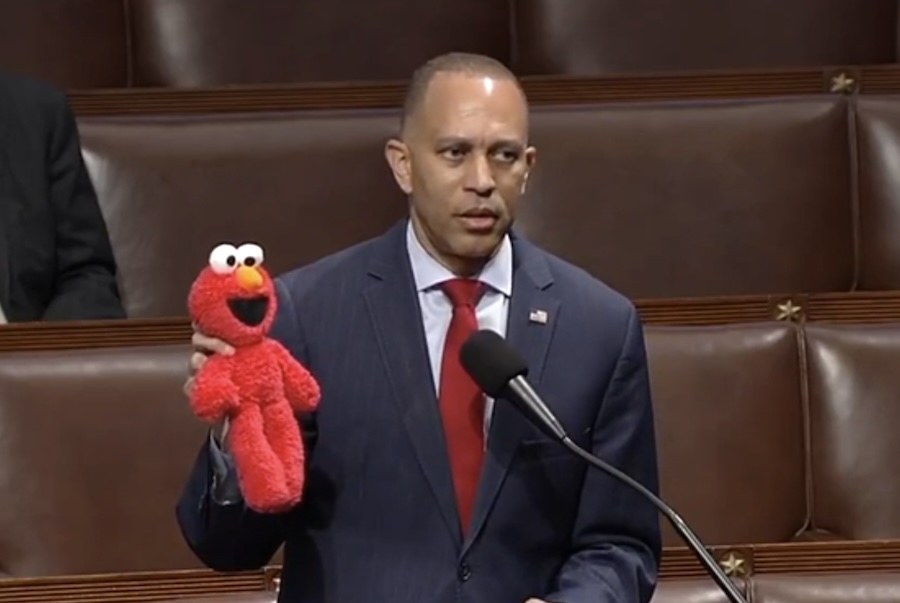Politics
Democrat Leader Waves Elmo Doll On House Floor To Defend Funding For PBS

House Minority Leader Hakeem Jeffries brought an unexpected prop to the House floor this week: a red Elmo doll.
The New York Democrat used the children’s character to protest a provision in President Trump’s $9.4 billion budget rescissions package that would reduce federal funding to the Corporation for Public Broadcasting, which helps support PBS and NPR.
“We’re on the floor of the House of Representatives, not debating legislation that is designed to make this country and our economy more affordable,” Jeffries said, “but actually debating legislation that targets Elmo and Big Bird and Daniel Tiger and Sesame Street.”
“That’s what we’re doing,” he said, “by going after public broadcasting in the United States of America. Sesame Street.”
Jeffries’ remarks came as the House moved forward with the GOP-backed proposal, which aims to reclaim already-appropriated discretionary funds from the current fiscal year. The measure passed a procedural rule vote Wednesday, setting up a final floor vote later this week.
WATCH:
The legislation includes roughly $1 billion in cuts to the Corporation for Public Broadcasting and $8.3 billion in reductions to the U.S. Agency for International Development. Republican leaders framed the proposal as a responsible effort to rein in federal spending, with Majority Leader Steve Scalise (R-LA) championing it as part of a broader “America First” fiscal agenda.
While Jeffries’ use of Elmo drew attention, Republicans argue that the funding debate is less about Sesame Street and more about whether taxpayer dollars should continue supporting media entities they say lean left politically.
Programs like Sesame Street, critics point out, have already made successful inroads into the private sector. In 2015, Sesame Workshop, the nonprofit behind the show, signed a five-year deal with HBO following an $11 million financial loss. Under that agreement—and a subsequent one with WarnerMedia—new episodes premiere on HBO and HBO Max before eventually airing on PBS. The arrangement provides Sesame Workshop with significant corporate backing, while PBS continues airing reruns.
Supporters of the proposed budget cuts contend that this hybrid model undercuts the argument for continued federal support. If a program is already thriving on commercial platforms like HBO and Netflix, they say, it should not also be subsidized by taxpayers.
Republicans have also raised concerns about perceived ideological bias within public broadcasting. Senator Ted Cruz (R-TX) and others have called for greater oversight into how federal dollars are spent by PBS and NPR, accusing the networks of promoting progressive views in both children’s programming and news coverage.
Meanwhile, the White House’s newly established Department of Government Efficiency (DOGE) has identified over $280 billion in potential federal budget savings since January, according to administration officials. That would amount to over $1,000 per taxpayer in reclaimed funds.
As Congress works to finalize the rescissions package, Republicans are also advancing a broader piece of legislation known as the “Big Beautiful Bill.” The bill, which is moving through the budget reconciliation process, seeks to make the 2017 Trump tax cuts permanent and allocate billions toward border security.
Because reconciliation rules allow for passage with a simple majority in the Senate, GOP lawmakers made several technical adjustments this week to ensure the bill meets the chamber’s procedural requirements, including what is known as the “Byrd Bath”—a review by the Senate parliamentarian to determine which provisions qualify under reconciliation rules.
While the Big Beautiful Bill addresses mandatory spending, the $9.4 billion rescissions package targets discretionary spending that Congress revisits annually. Lawmakers now have 45 days to act on the package before it is automatically rejected under existing congressional rules.

